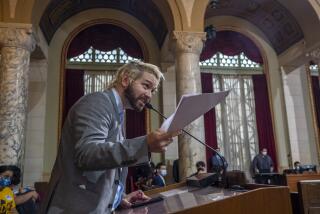A coupla white dudes sitting around hating hippies, Panthers and liberals
- Share via
On Jan. 16, 1970, two of the most influential law enforcement leaders of the period the long-standing head of the FBI and the flamboyant, brilliant and irascible chief of the LAPD sat down to talk about the sorry state of society. [pdf], which was obtained by Editorial Page Editor Jim Newton during research for his biography of Earl Warren, provides a rich, funny summary of the meeting, in which the two top cops find plenty of common enemies both in the counterculture and the establishment.
History would treat the two men differently. J. Edgar Hoover was respected and feared at the time of this meeting, but after his death his reputation would steadily sink. Ed Davis, by contrast, was an outspoken and irreverent chief, but the passage of time would bring him greater respect. Today, his innovations at the LAPD are regarded as early experiments in community policing, and he is considered by many to have been the greatest chief in the department’s history.
But in this conversation the two were in perfect harmony lamenting the rise of hippies and the Black Panther Party; denouncing news organizations including the L.A. Times; disdaining Hollywood and political liberals, and apparently taking note of the Leonard Bernstein cocktail party immortalized in Tom Wolfe’s article “Radical Chic.”
Interestingly, the colloquy about Warren detailed on page 2 is riddled with errors. Alameda was corrupt in the early 1900s but less so during the period that Warren was California’s attorney general (1939-1943). Earlier, Warren served as the District Attorney of Alameda but, contrary to Davis’ suggestion that he did nothing about the corruption there, Warren in fact built a reputation as a corruption-fighter, sending the sheriff and other top officials to prison. Moreover, far from looking upon law enforcement as “corrupt and bad,” Warren was a lifelong supporter of police and prosecutors, and though many resented his rulings in cases such as Miranda v. Arizona (establishing Miranda rights), Warren always valued his friends in law enforcement.


